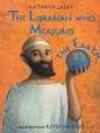|
The Librarian Who Measured the Earth

Last updated Friday, March 26, 2010
Author: Kathryn Lasky
Illustrator: Kevin Hawkes
Date of Publication: 1994
ISBN: 0316515264
Grade Level: 4th (GLCs: Click here for grade level guidelines.)
Date(s) Used: Apr. 2010
Synopsis:
This picture book covers the life of Eratosthenes of Cyrene, a geographer who estimated the circumference of the Earth in around 200 B.C.. Though he was in fact a librarian, he is famous for his scientific accomplishments. Since little is known about his personal life, Lasky describes his early years in general terms. He liked to ask questions, loved learning at the gymnasium, and sailed off to Athens to further his studies. He became tutor to the son of King Ptolemy III of Egypt, and eventually became the head of Alexandria's magnificent library. Readers don't come to know the subject intimately, but they do get to know his times very well. The narrative is filled with fascinating details about his world. Hawkes's illustrations make a large contribution, as they contain authentic examples of the art, architecture, and social structure of ancient life. His paintings are rich and warm and filled with touches of humor, making the people, as well as their environment, come alive. The pictures combine with the text to give a clear explanation of how the man came to make his key discovery about the Earth's circumference. A fine combination of history, science, and biography.
Steven Engelfried, West Lynn Library, OR
| Note to readers: |
| • |
In this story, you will come across several Greek words and names. Don’t worry if you don’t pronounce them correctly the first time (or if you have trouble sounding them out). It is actually beneficial for the kids to see you trying, and also to see that even though you may not get the pronunciation exactly spot-on, you are still able to make meaning of the story.
|
| Discussion topics for before reading: |
| • |
What do you think this book will be about?
|
| • |
What does a librarian do? Why do you people measure things? Why do you think a librarian would measure the earth?
|
| • |
How would you measure your room? How about your school? How would you measure the earth? What units of measurement would you use for each? What tools would you use for each? What is different about each method?
|
| • |
Why do you think the man on the cover is holding the earth like a basketball?
|
| • |
Where and when do you think this story takes place? What clues can you find on the cover to help you decide?
|
| Discussion topics for during/after reading: |
| • |
Use the map/globe in the classroom to locate where the story takes place.
|
| • |
What are some differences between where Eratosthenes went to school and where you go to school? Which school do you like better?
|
| • |
What is your favorite subject? Why?
|
| • |
Did you watch any of the Olympics? Which sports did you enjoy the most?
|
| • |
What things does your librarian need to do to keep the library in order? What can you do to help?
|
| • |
Have you heard of a Pentathlon? (Related to Eratosthenes’ nickname “Pentathlos;” consists of long jump, javelin throw, discus throw, stadion (a short foot race), and wrestling)
|
| • |
What do you think the job of the royal flatterer is? What is flattery? Do you think you would like this job?
|
| • |
How is the Library at Alexandria similar to the internet? (When Eratosthenes is in the library researching all the scrolls, he is working to combine information from various sources, similar to how we now use the internet).
|
| • |
What do you think Eratosthenes could use instead of camels to measure the distance between Alexandria and Syene?
|
| • |
The difference between Eratosthenes’ measurement of the earth’s circumference and the modern scientific measurement is 200 miles. Do you think this is a big difference?
|
| Craft ideas: |
| • |
Have the kids make Olympic Medals with construction paper and string.
|
| • |
Make scrolls with pictures or writing inside with rolled up paper
|
| • |
Make a perfect circle using a pencil tied to a string
|
| Special activities: |
| • |
You can have your own Olympic games (ask questions for an "Olympic Mind Games," or play Simon Says as an "Olympic sport")
|
*Note: These craft ideas are just suggestions.
You can use them, but you don't have to use them.
You can expand upon them, or add your own twist.
Remember, though, that the focus of your time should
not be on the development and execution of a craft;
the focus should be on the read-aloud and the
enjoyment of the book!
|
